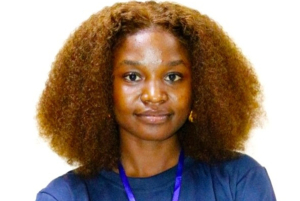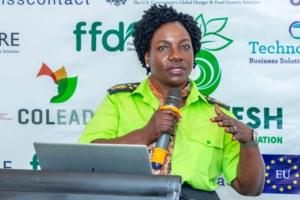Birahim Babou Uses mLouma to Modernize Senegalese Agriculture
-
mLouma digitizes price discovery, market access, and services across Senegal’s agricultural value chain.
-
Co-founder and CTO Birahim Babou targets information asymmetry between producers and markets.
-
The platform integrates pricing data, weather services, e-learning, and online marketplaces to improve decision-making.
Birahim Babou is a Senegalese computer engineer and technology entrepreneur. He co-founded and serves as chief technology officer of mLouma, where he supports agricultural stakeholders in production, marketing, and purchasing.
Founded in 2012, mLouma operates as a digital platform designed for Senegalese and African agricultural realities. The company aims to become a reference in digital agriculture by connecting producers, buyers, suppliers, institutions, and young entrepreneurs through simple and accessible tools.
The platform delivers up-to-date information on prices, availability, and product locations. Users leverage this data to guide buying and selling decisions. An intuitive dashboard aggregates multiple services, including agricultural weather updates, access to training content, market monitoring, and online shop management.
In parallel, mLouma developed several complementary solutions. Louma Mbay operates as an online marketplace where agricultural actors list and sell products. Louma du savoir provides an e-learning platform dedicated to agricultural training. Météo Mbay delivers climate information tailored to producers.
Alongside mLouma, Birahim Babou co-founded in 2020 and leads digital learning at Solutions Numériques pour l’Afrique, a Morocco-based software firm that applies technology to education. He also serves as IT project manager at Écoles au Sénégal, an initiative that uses digital tools to reduce inequality in access to quality education.
Birahim Babou holds a master’s degree in software engineering and network administration obtained in 2018 from the École supérieure de technologie et de management du Sénégal. He also graduated from the Université Cheikh Anta Diop de Dakar, where he defended a PhD in mathematics and computer science in 2020.
He began his professional career in 2014 as a senior IT technician at the Université virtuelle du Sénégal. The institution promoted him in 2017 to head of the applications and digital services division within the IT and information systems directorate.
Between 2019 and 2020, he served as head of digital learning at Accent Education, the edtech subsidiary of Moroccan computer hardware brand Accent.
This article was initially published in French by Melchior Koba
Adapted in English by Ange J.A de Berry Quenum
Trevor Murimba Connects and Secures African Farms with MyBitSecure
- Trevor Murimba founded MyBitSecure to enhance farm efficiency and cybersecurity across Africa.
- MyBitSecure provides digital tools for data protection, crop monitoring, and operational management.
- The company bridges agriculture and technology to improve productivity, reduce risk, and strengthen decision-making.
Trevor Murimba, a Cape Town-based cybersecurity expert, founded MyBitSecure to help African farms improve efficiency and security through accessible digital tools. His solutions connect farms, protect sensitive data, and optimize crop monitoring and daily operations.
Founded in 2023, MyBitSecure supports farmers and agribusinesses with tools that boost productivity, secure sensitive information, and simplify decision-making. The company positions itself as a bridge between agriculture and technology, seeking to build more organized, profitable, and resilient farms.
The tools address practical needs: monitoring fields, managing connected equipment, safeguarding data, and training users to integrate technology into agricultural production. Each solution aims to make farm operations more precise, predictable, and less vulnerable to human error, internal incidents, or cyberattacks.
MyBitSecure enables farmers to track activities on their land, anticipate problems, and manage resources efficiently. Users gain centralized visibility, better protection of strategic information, and reliable data to guide investment, harvest planning, and operational adjustments.
In addition to entrepreneurship, Murimba serves as a cybersecurity specialist at KingMakers, a company that develops platforms connecting fans to their favorite sports. He holds a network engineering degree from the Ansted School of Technology at the University of Zimbabwe.
Murimba began his professional career in 2002 at Prean Computers in Zimbabwe as an IT technician. He later held cybersecurity roles at companies including Engen, a South African energy firm, and Old Mutual Ltd, a pan-African financial services provider.
This article was initially published in French by Melchior Koba
Adapted in English by Ange J.A de BERRY QUENUM
Togo Entrepreneur Medede Bidassa Builds Tech Tools for Efficient Milk Production
-
Laitify, founded in 2024, deploys sensors, a unified dashboard and QR-code traceability to optimize dairy production from farm to distribution.
-
The system uses real-time data on animal health, milk volume and geolocation to help farmers manage their herds and forecast supply.
-
Laitify integrates AI analytics to generate recommendations on herd management, productivity gains and commercial planning.
Togo positions digital technology as a driver of efficiency in the dairy sector as producers seek tools that structure the journey of milk from breeding to distribution. Medede Bidassa proposes a digital method that documents each step and helps farmers manage their operations more effectively.
Medede Bidassa works as a tech entrepreneur in Togo with the goal of placing digital tools at the service of dairy producers. She co-founded Laitify and serves as its CEO. The company designs technological solutions that improve farm management and strengthen control over dairy production.
Laitify, founded in 2024, deploys a platform that transforms dairy practices from breeding to distribution. The system uses sensors that track in real time the health of cattle, the volume of milk produced and the animals’ geolocation.
The platform consolidates all data on a central dashboard. It displays key indicators for each farm, including production statistics, sales performance and operational metrics.
Laitify also integrates a QR-code traceability system. The tool records each batch of milk into a single database, which facilitates stock control, supply planning and access to production history.
This digital organization enables producers to anticipate their needs, secure the production chain and reduce inefficiencies.
The platform embeds an AI engine that analyzes collected data and generates recommendations. These insights support decisions related to herd management, productivity improvements and commercial planning.
In parallel, Bidassa co-founded Amazing Girls on Tech in 2024, a training program for young women interested in technology careers. She leads its technical training division. She also manages the online community of Tech Communities Day, an initiative dedicated to technology dynamics and collaborative innovation.
Bidassa holds a certification in computing and Internet technologies from the FORCE-N program in Senegal. She currently works as a freelance web developer and serves as team lead for the Google Developers Group in Lomé.
This article was initially published in French by Melchior Koba
Adapted in English by Ange Jason Quenum
Tanzania’s LimaBot Uses AI to Cut Crop Losses
-
LimaBot allows Tanzanian farmers to diagnose crop diseases in real time through mobile apps, WhatsApp, SMS and USSD.
-
The platform recommends treatments and provides weather forecasts and preventive management strategies.
-
The solution aims to cut yield losses, reduce excessive pesticide use and strengthen farmers’ resilience.
LimaBot AI is emerging as a key player in Tanzania’s agricultural innovation by bringing artificial intelligence directly to smallholder farms. The Tanzanian start-up built a digital platform that farmers can access via mobile application, WhatsApp, SMS or USSD to diagnose crop diseases in real time. The company, based in Arusha, launched in 2024 under founder Godfrey Kilimwomeshi.
The platform does more than provide general advice. It analyses data, photos and symptom descriptions submitted by farmers, recommends biological or chemical treatments, and supplies weather forecasts and preventive management strategies. Because it functions in low-connectivity areas, farmers can interact with LimaBot through simple channels such as SMS and USSD.
Crop-disease losses continue to undermine family farming across Africa, particularly in Tanzania. By enabling early detection and offering tailored recommendations, LimaBot helps limit yield pressure, reduce excessive pesticide use and support more sustainable practices.
The solution creates dual benefits for farmers. It secures harvests while helping producers build autonomy through progressive training in plant-health best practices. This capacity building can improve resilience to climate shocks and volatile input prices.
By democratising access to quality diagnostics, the start-up strengthens the emergence of a sustainable agri-tech ecosystem. LimaBot positions AI as a tool that boosts productivity, supports food security and improves the economic well-being of farmers.
This article was initially published in French by Adoni Conrad Quenum
Adapted in English by Ange Jason Quenum
Khanya Nyawo Simplifies Crop Monitoring with Visual Data Analytics
-
Badger Analytics, founded in March 2025, uses satellite and drone imagery to create color-coded crop health maps.
-
The platform helps farmers identify high- and low-performance areas to guide precise interventions.
-
Khanya Nyawo also heads Premier Agric, a consultancy promoting productivity and sustainable farming practices.
South African tech entrepreneur Khanya Nyawo is leveraging visual data analytics to make crop management simpler and more efficient. As the founder of Badger Analytics, he has developed a digital platform that helps farmers monitor and understand crop health through imagery-based data.
Founded in March 2025, Badger Analytics automatically collects data from satellite and drone images. The system cleans and processes this data to generate color-coded crop health maps, enabling farmers to quickly spot areas performing well and those needing intervention.
The results are displayed on an interactive dashboard designed for on-field use. Farmers can view the condition of their plots at a glance and convert complex datasets into practical, daily insights—without requiring technical expertise.
The platform targets commercial and smallholder farms that want to track crop health across seasons and optimize interventions based on measurable indicators. It caters to both producers seeking a comprehensive overview and managers aiming for data-driven decision-making.
Alongside Badger Analytics, Nyawo serves as managing director of Premier Agric, an agribusiness consultancy offering support in crop management, product development, training, and agricultural insurance. The firm focuses on boosting productivity, reducing costs, and promoting sustainable practices across Africa’s farming ecosystem.
Before this, Nyawo led Khathom Agriculture between 2016 and 2020, a company dedicated to agricultural advisory services and farmer empowerment in Southern Africa.
A graduate of Cedara College of Agriculture in South Africa (class of 2013), Nyawo has built his career around integrating technology and agronomy to empower African farmers through innovation and accessibility.
This article was initially published in French by Melchior Koba
Adapted in English by Ange Jason Quenum
South African Entrepreneur Joel van der Schyff Optimizes Greenhouse Farming with Data
-
AgriLogiq, founded in 2020, develops predictive automation systems for greenhouse and tunnel farming.
-
The company integrates climate, irrigation, and fertilization controls driven by real-time data analytics.
-
Joel van der Schyff combines engineering and technology to enhance resource efficiency and crop yields.
South African entrepreneur Joel van der Schyff is transforming how producers manage greenhouse crops by placing data at the core of agricultural operations. As co-founder, CEO, and head of growth at AgriLogiq, he merges engineering expertise with technological innovation to optimize controlled-environment farming.
Founded in 2020, AgriLogiq designs predictive automation systems for greenhouses and tunnels. These systems help farmers boost yields while optimizing water, energy, and input use.
AgriLogiq’s integrated solutions combine climate, irrigation, and fertilization controls, all powered by data analysis to adjust growing conditions in real time. The company connects farmers to their operations via a comprehensive digital platform that links sensors, hardware, and automation software.
By collecting, processing, and interpreting data, AgriLogiq enables growers to improve precision and efficiency in every stage of protected cultivation.
Before founding AgriLogiq, van der Schyff co-founded Machman in 2011, a firm that provided manufacturing improvement solutions for the agro-processing sector. He served as sales and finance director until 2017.
He later joined LLB Innovative Foods in 2019 as operations director, and became project and third-party distribution manager in 2020. Between 2021 and 2024, he was also a shareholder at TS Tec, a provider of IT security and support services.
Van der Schyff earned a mechanical and electrical engineering diploma from Northlink College in 2011 and an MBA in operations management from the University of Cape Town Graduate School of Business in 2018.
Through AgriLogiq, he aims to make data-driven agriculture accessible to a wider range of producers in Africa, helping them balance productivity, sustainability, and profitability in a changing climate.
This article was initially published in French by Melchior Koba
Adapted in English by Ange Jason Quenum
Amir Redwan Bets on Group Buying to Support Ethiopian Farmers
-
ChipChip connects farmers directly with urban consumers through group-buying technology.
-
The company pays “group leaders” to organize collective orders and deliveries.
-
Amir Redwan previously founded Tikus Delivery, a bicycle-based food-delivery service in Addis Ababa.
Ethiopian software engineer and entrepreneur Amir Redwan is using technology to connect rural farmers to urban consumers. He co-founded ChipChip to allow buyers to pool orders and cut distribution costs.
Founded in 2023 by Redwan and European entrepreneur Mateo Klemmayer, ChipChip operates a group-purchasing platform that links customers with agricultural producers outside traditional supply chains. The company aims to provide competitive prices while supporting farmer incomes.
ChipChip groups customers into buying clusters to reduce acquisition costs. Farmers benefit from direct access to the market. The company pays “group leaders” to form and manage purchasing groups and oversee coordination and delivery.
Before ChipChip, Redwan co-founded Tikus Delivery in 2020 and serves as its CEO. The service offers mobile food ordering and home delivery in Addis Ababa using electric and non-electric bicycles.
Redwan graduated in 2018 with a bachelor’s degree in software engineering from Addis Ababa Science and Technology University. He completed an internship at Kifiya Financial Technology before becoming a software engineer in 2019. He worked for Modern Cyber Intel Consultancy and Med Innovation in Ethiopia’s technology sector.
This article was initially published in French by Melchior Koba
Adapted in English by Ange Jason Quenum
Moroccan Entrepreneur Wissal Ben Moussa Revives Degraded Lands With Sand to Green
Moroccan agri-food engineer and entrepreneur Wissal Ben Moussa co-founded Sand to Green in 2022 and serves as its agricultural director. The agri-tech startup focuses on regenerative farming projects aimed at restoring degraded soils and improving agricultural resilience.
Sand to Green builds its models on environmental data analysis, guiding farmers and industry players toward resilient, traceable systems with measurable climate and economic impact.
The company developed RegenWise, a software platform that evaluates land characteristics and generates project scenarios including crop selection, plant combinations, spatial layouts, and irrigation systems. The tool provides technical guides for implementation, tracks plantation progress, and produces reports aligned with ESG certification standards. It also supports processes related to carbon credit initiatives.
In September 2025, Sand to Green secured third place in the national round of the Orange Social Venture Prize for Africa and the Middle East (POESAM). The startup also joined the AI Founder Sprint program at INSEAD’s AI Venture Lab and was named a finalist in the Food Tech Challengers competition.
Ben Moussa graduated in 2012 as an agri-food engineer from the Hassan II Agronomic and Veterinary Institute in Morocco and earned a master’s degree in innovation management for agro-industries from AgroParisTech in 2013.
Her early career included research at the INRH’s specialized seafood processing center in 2012 and a junior consulting role at Quaternaire in 2013. In 2014, she joined the Moroccan Innovation Center as a performance and development officer. From 2015 to 2017, she worked at Unilever Morocco in food R&D, supporting the local head of the department.
This article was initially published in French by Melchior Koba
Adapted in English by Ange Jason Quenum
Gates Foundation Commits Over $10 Million to Senegal’s Tech New Deal
- The Gates Foundation pledged more than $10 million to support Senegal’s New Deal technologique, its national digital strategy launched in February 2025.
- The partnership will fund a universal digital ID, an AI hub for health and agriculture, and a Delivery Unit to oversee project transparency and efficiency.
- Senegal’s digital strategy requires $2 billion, of which $155 million still needs to be secured.
Senegal signed a $10 million-plus partnership with the Gates Foundation on September 24 to accelerate its national digital strategy, known as the New Deal technologique. The agreement was finalized on the sidelines of the 80th United Nations General Assembly in New York, the state broadcaster RTS reported.
Le Président a reçu en audience M. @BillGates, Président de la Gates Foundation.
— Présidence Sénégal (@PR_Senegal) September 24, 2025
Cette rencontre a permis de conclure un partenariat stratégique de plus de 10 millions de dollars pour accélérer le #NewDealTechnologique et faire du Sénégal un hub africain d’innovation numérique. pic.twitter.com/kBJk37Sigr
The program, launched in February 2025 by President Bassirou Diomaye Faye, aims to transform public services, strengthen digital sovereignty, and establish Senegal as a regional technology hub by 2034.
The deal provides for the rollout of a universal digital identity system, the creation of an artificial intelligence hub focused on health and agriculture, and the establishment of a Delivery Unit to ensure project transparency and efficiency.
The partnership follows an initial meeting between Bill Gates and President Faye during the 79th UN General Assembly, when both sides agreed to expand cooperation in areas including AI-assisted agriculture, sanitation, and digital innovation across strategic sectors.
Senegal budgeted CFA1,105 billion (about $2 billion) for the New Deal technologique. Authorities have already identified CFA950 billion, leaving CFA155 billion still to be mobilized.
Officials expect the Gates Foundation’s contribution to accelerate the implementation of priority projects, expand inclusive digital services for citizens, and attract additional private investment into Senegal’s tech ecosystem.
This article was initially published in French by Samira Njoya
Adapted in English by Ange Jason Quenum
Uganda Embraces Digital Traceability System to Boost Agricultural Exports
The adoption of a digital traceability system facilitates better quality control and enhances the reputation of African produce globally. It will offer new opportunities for farmers and exporters while addressing the barriers that have historically hindered market access.
Uganda is adopting a digital traceability system aimed at boosting the global competitiveness of its fruit and vegetable farmers, Dr. Caroline Nankinga from the Ministry of Agriculture, Animal Industry and Fisheries revealed at a press conference held on September 23.
Dr. Nankinga emphasized the system’s role in enhancing efficiency, noting that, starting September 30, 2024, agricultural inspectors will use the platform to verify consignments, expediting operations.
The system, developed by the Re-engineering of Uganda's Sanitary and Phytosanitary Inspection of Horticulture Exports (RUSH) initiative, seeks to improve tracking of fresh produce from farms to Entebbe International Airport, ensuring compliance with international standards and reducing market access barriers caused by past interceptions. It is set to transform the inspection and certification process, replacing the outdated manual documentation methods with a streamlined digital platform.
One of the major benefits of RUSH is its ability to address long-standing challenges, such as delays and interception risks due to manual processes. Exporters can now upload essential documents online, enabling real-time compliance checks and swift corrective measures if issues arise during inspections.
Pests and diseases are major causes of export interceptions in Uganda. According to HortiFresh, a business membership organization that supports Uganda's Fresh Fruits and Vegetables (FFV) sector, in 2022, over 200 interceptions were reported due to pests, leading to substantial revenue losses for exporters. The RUSH system's digital traceability solution directly addresses these challenges by ensuring better monitoring, compliance, and real-time corrective actions. This can help reduce interceptions, safeguard revenue, and restore confidence in Uganda's agricultural exports.
Hikmatu Bilali











